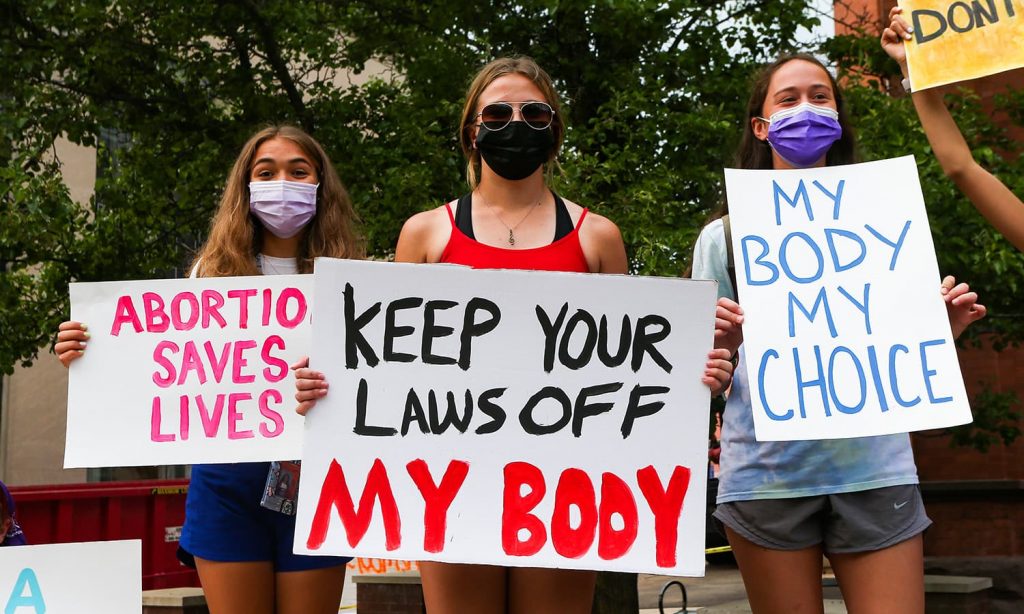In a landmark decision that will change the landscape of America, the U.S Supreme Court has overturned the ruling of Roe v. Wade. According to The Conversation, overturning such a policy prevents abortions from being a right that’s federally protected. Instead, each U.S state now gets to decide whether abortions will be legal or not. As per The New York Times, eight states have already outlawed abortions. But to make matters worse, these places probably won’t be alone in preventing women from receiving the medical procedures that they need.
Related: US Supreme Court Overturns Roe v. Wade — But for Abortion Opponents, This is Just the Beginning
The fact that Roe v. Wade has been overruled is sending shockwaves through America. But it’s also making many folks around the world wonder what the abortion rights are like where they’re living. This is no expectation for those of us in Australia.
On July 20, 3AW’s Neil Mitchell asked our Prime Minister Anthony Albanese, if he would require all public Australian hospitals to make abortions available in exchange for funding. Albanese said no, before defending his position by claiming, “States control the health system. They deal with these issues.”
So, with that in mind, what are Australia’s abortion rights like? Because Albanese is correct when he stated that they currently change depending on what state or territory you’re in. That’s why we’re about to deep-dive into the rules and regulations that pertain to everywhere across Australia.
New South Wales
In October 2019, NSW abortions were stricken from the Crimes Act of 1900. Moreover, the Abortion Law Reform Act 2019 was passed. Family Planning NSW states that this means that pregnant people can no longer be arrested for getting a legal abortion.
Doctors in this state are able to perform abortions if they get informed consent and if their patient is less than 22 weeks pregnant. If you’re over 22 weeks pregnant, then your abortion has to be performed in a hospital or another approved facility by a specialist.
Queensland
In Queensland, abortion laws are quite similar to the ones of NSW. This is because they passed the Termination of Pregnancy Act 2018. Queensland Health outlines that this legislation guarantees that abortions are treated as a health issue instead of a crime throughout this state.
If a person wants to get an abortion in Queensland when they are less than 22 weeks pregnant, they can do so without justifying their decision to their doctor. If they are more than 22 weeks pregnant, then two separate medical practitioners must both agree that their abortion should proceed.
ACT
The ACT’s abortion laws are slightly different from that of NSW and Queensland. In a resource published by ACT Health, they state people can get medical abortions up to eight weeks after getting pregnant and surgical abortions from up to 16 weeks after getting pregnant. They also note, “In specific cases, the Canberra Hospital can provide an abortion at a later gestation.”
Victoria
In 2008, Victoria passed the Abortion Law Reform Act 2008. This legislation decriminalised the act of getting an abortion in this state.
According to the Better Health Channel, individuals are able to get an abortion up to 24 weeks after getting pregnant. If a person wants an abortion after 24 weeks, then their medical practitioner must get a second opinion from a different medical practitioner that concurs that this procedure is needed.
In May 2016, the Victorian Public Health and Wellbeing Act 2008 was updated to provide additional safety for abortion providers and their patients. They did this by creating safe access zones around abortion providers, which prevent bad actors from harassing folks entering these premises.
Tasmania
In a resource published by Family Planning Tasmania, this organisation says that medical abortions are available up to nine weeks after getting pregnant. They also detail surgical abortions are available up to 12 to 14 weeks after getting pregnant. If someone requests an abortion after 16 weeks of being pregnant, then their situation needs to be evaluated by two doctors. These doctors will determine whether or not their abortion will go ahead.
Northern Territory
In 2021, the ABC reported that the Northern Territory parliament had passed legislation that made getting an abortion a lot less difficult. Pregnant people no longer had to consult two doctors if they wanted to get an abortion between 14 weeks and 24 weeks after getting pregnant. These folks would instead be allowed to discuss this subject with just one doctor.
The Northern Territory parliament also made it so individuals could easily access abortions 24 weeks after getting pregnant instead of 23. They also made it legal to terminate a pregnancy after 24 weeks if the procedure was approved by two doctors.
Western Australia
Western Australia is considered by some to be lagging behind most of Australia’s other states and territories when it comes to abortion rights. This is because, as Go To Court expresses, people can’t easily access abortions in this territory after being 20 weeks of being pregnant.
As Go To Court put it, an individual can only get an abortion after 20 weeks, if “two medical practitioners who are members of a panel appointed by the minister have agreed that the mother, or the unborn child, have a severe medical condition that justifies the procedure.”
South Australia
Unfortunately, South Australia may have the worst abortion laws in the country. This is because, as InDaily reported, abortions were only decriminalised in 2021. In May of that year, the South Australian parliament passed the Termination of Pregnancy Act 2021, which allowed pregnant individuals to get an abortion after being pregnant for 22 weeks and six days.
However, in May of 2022, abortion advocates said that these laws were yet to be put in place and that pregnant people were still being constrained by the state’s old, archaic rules. Dr. Brian Peat told InDaily, “Women are still getting abortions, it’s just through the old way, which means for women in the country they have to fly down to Adelaide and face a significant waiting list.” He also noted, “No one seems interested in making it happen.”
Read more stories from The Latch and subscribe to our email newsletter.







